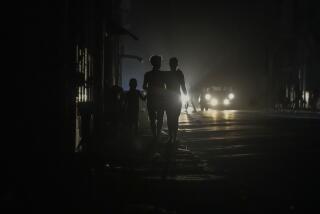LATIN AMERICA : Castro Seen as Able to Take the Heat : Summer may bring economic woes, but analysts say Cuban can overcome unrest.
- Share via
WASHINGTON — Cuba faces the specter of another round of economic troubles and public discontent this summer, but unless Fidel Castro “seriously miscalculates,” he is expected to remain in power, according to diplomats and U.S. officials.
“There will be a food shortage and a drop in available electricity, probably in August and early September,” one U.S. analyst said, “but as far as we can tell, Castro can still handle it.”
Cuba suffers from a chronic lack of food production, an even poorer agricultural distribution system and an outdated electrical grid. The result: severe electrical blackouts during the hot summers and a serious drop in food availability, particularly fresh vegetables and meat.
These shortages have led to public rumblings in recent years. Last August, demonstrators rioted in Havana, setting off a massive exodus by about 30,000 hungry and angry Cubans, most of whom tried to reach the United States on flimsy rafts and makeshift boats.
*
“Actually,” one U.S. official said, “the Castro government handled August and the (boat exodus) very well. Security forces contained the protests in a couple of days without any major casualties, and the migration served him politically as a safety valve and pressure point on the United States.”
Even though the government has made some market reforms, increased food production and upped its electrical output, the analysts say the basic weaknesses of the Cuban economy will lead to yet another miserable summer.
“Castro’s commitment to a basic socialist economy is unchanged,” one U.S. official said, “and the reforms are limited, as is the government’s access to the foreign funds necessary for major improvements.”
But if there is a repeat of protests, Castro will survive, at least for now, the analysts predict.
“Castro’s government is still in very good shape,” said a U.S. official who specializes in Cuban politics. “He still has the allegiance of the Communist Party, the army and the security forces.
“There is nothing to indicate the military, for instance, is saying, ‘Enough is enough.’ ”
Still, Castro is playing a game in which he has little room for error, according to the experts, even though the Cuban economy actually has improved.
Because of the reforms, no matter how limited, and foreign investment, the Cuban government projects an economic growth rate of just under 2% this year.
But, cautioned one foreign diplomat whose country has extensive economic ties with Cuba, “the best they can hope for is very slow progress for a very few Cubans, a dangerous situation because of widespread rising public expectations.”
A U.S. official agreed, pointing out that the benefits of reform are limited to a small segment of Cuba’s 11 million people, mostly those who live in Havana and have access to U.S. currency.
“The government has tried to keep expectations (over the benefits of economic reforms) down, but new tensions are bound to form between the haves and have-nots,” he said.
*
This will be particularly true as people realize that the projected economic growth is the result of policies calling for severe job layoffs, a major cut in government services and another drop in the standard of living, according to the officials.
“Cuba’s economy already has contracted by 50% since 1989,” one analyst said. “The bottom line is 500,000 people out of work over time. This represents not just economic reform, but a change in the social contract. Castro promised a revolution that guarantees full employment.”
So while “Cuba is basically stable for the moment,” a U.S. official said, “the situation is tense enough that a miscalculation, soldiers shooting at protesters or a prolonged electrical outage, could set off something the government won’t be able to control.”
More to Read
Sign up for Essential California
The most important California stories and recommendations in your inbox every morning.
You may occasionally receive promotional content from the Los Angeles Times.










